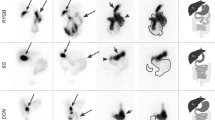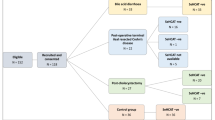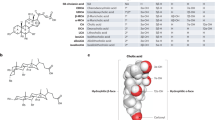Abstract
Bile acids enhance colorectal carcinogenesis in animals and man, perhaps after degradation by faecal anaerobes. The promotional effect of sodium deoxycholate (SDC) and its relationship to bacteria was examined in male Sprague-Dawley rats (n = 115) which had received a 6-week course of azoxymethane (total dose 90 mg kg-1 s.c.) Two groups received 3 X weekly intrarectal (i.r.) instillations of N saline or 0.12 M SDC for 18 weeks. Another group received SDC i.r. plus metronidazole (22.5 mg kg-1) daily in the drinking water. Controls had no instillations or metronidazole alone. By 28 weeks SDC had increased mean colonic crypt depth by 9% (P less than 0.001), and had almost trebled colorectal tumour yields from 2.4 +/- 0.4 per rat (mean +/- s.e.) in controls to 6.4 +/- 0.5 (P less than 0.001). Tumour yields after SDC + metronidazole (4.2 +/- 0.5) remained 75% higher than in controls (P less than 0.01) but were 33% less than after SDC alone (P less than 0.01), and the increase in crypt depth was maintained at 7% (P less than 0.001). Neither metronidazole alone nor saline i.r. had any effect on tumour yield, but metronidazole alone reduced crypt depth by 9% (P less than 0.001). Deoxycholate is a potent cocarcinogen and also stimulates mucosal hyperplasia. Metronidazole reduces its tumour-promoting effect, suggesting that faecal anaerobes are important in bile acid cocarcinogenesis.
This is a preview of subscription content, access via your institution
Access options
Subscribe to this journal
Receive 24 print issues and online access
$259.00 per year
only $10.79 per issue
Buy this article
- Purchase on Springer Link
- Instant access to full article PDF
Prices may be subject to local taxes which are calculated during checkout
Similar content being viewed by others
Rights and permissions
About this article
Cite this article
Rainey, J., Maeda, M., Williams, C. et al. The cocarcinogenic effect of intrarectal deoxycholate in rats is reduced by oral metronidazole. Br J Cancer 49, 631–636 (1984). https://doi.org/10.1038/bjc.1984.98
Issue Date:
DOI: https://doi.org/10.1038/bjc.1984.98
This article is cited by
-
Experimental models of colorectal cancer
Diseases of the Colon & Rectum (1998)
-
Exposure to bile acids and bacteria over 24 hours following partial gastrectomy, vagotomy, and pyloroplasty
World Journal of Surgery (1986)



